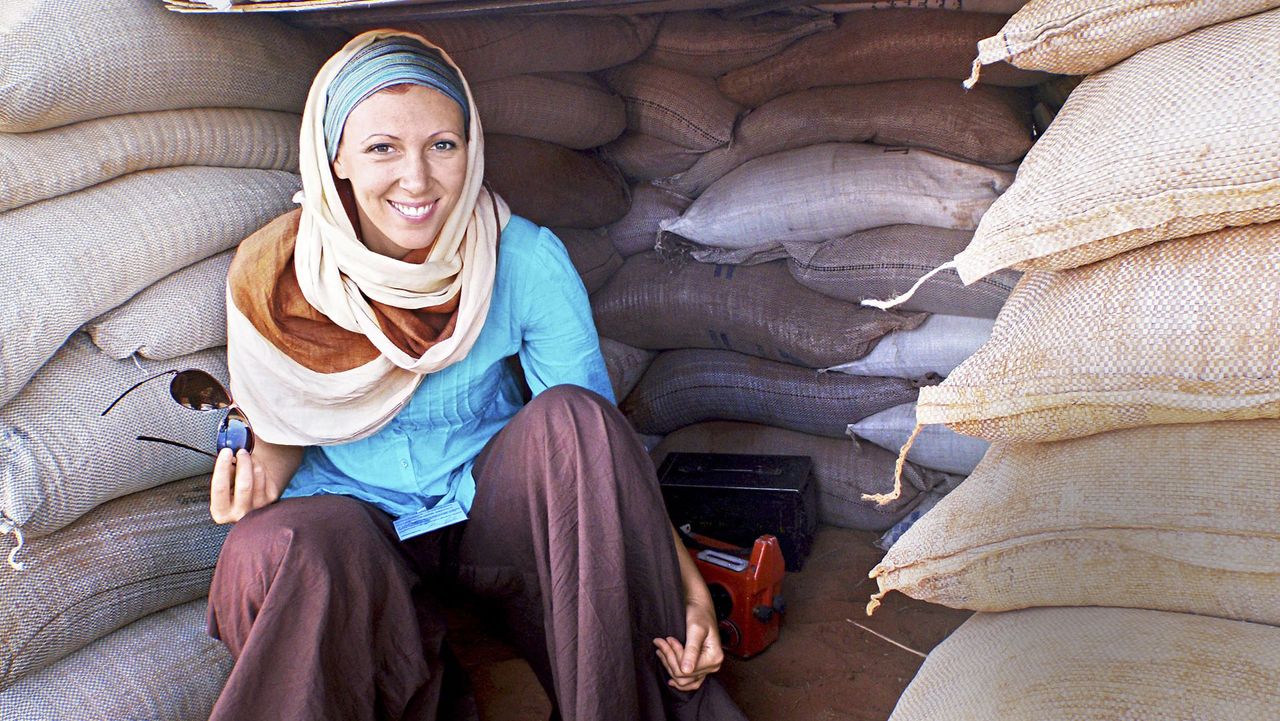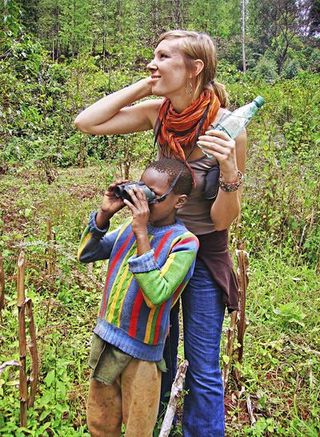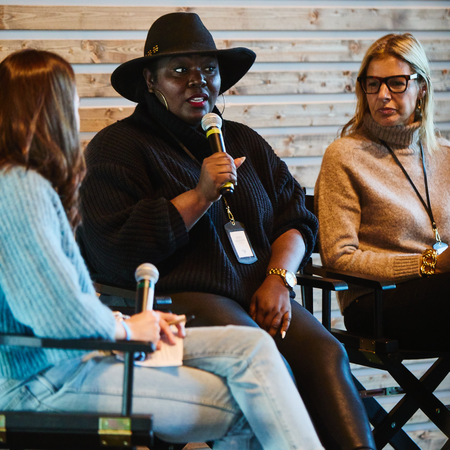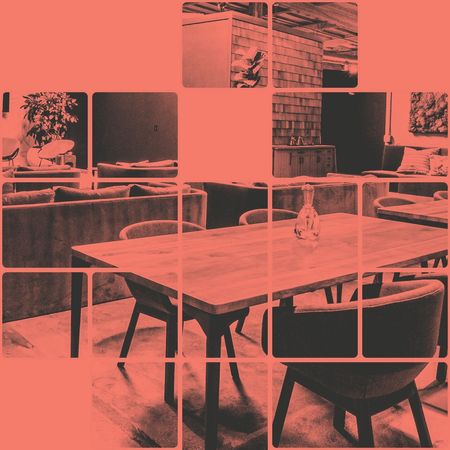Jessica Buchanan: Kidnapped!
On October 25, 2011, 32-year-old aid worker Jessica Buchanan and a Danish colleague were ambushed en route from a land mine awareness training program in southern Somalia and taken by pirates who had moved their ransom schemes from sea to land. Their price? $45 million. Here, she recounts the harrowing abduction that led to 93 days in captivity and a dramatic rescue by the elite U.S. Navy SEAL Team Six. Join our Google Hangout with Jessica on Wednesday, May 15 at 11:30 a.m. EST at plus.google.com/+marieclaire. Plus, submit your questions using #MCJB — they could be answered live!

I know it's not the best time to leave our home in the city of Hargeisa, Somalia, and make the journey 480 miles southeast. My NGO (nongovernmental organization) keeps a field office there, next to a dangerous border called the Green Line separating territories partially held by the Islamists from those still controlled by the official Somali government.
The Green Line is invisible, known best by the people it divides, never included on official maps of Somalia. I've had my eye on the violence down there for a long time. It isn't something I actively fear; I watch it the way a farmer keeps an eye on the horizon.
My concern is getting caught in the crossfire of any one of the countless acts of clan warfare or random hooliganism that plague southern Somalia and keep it in a state of general anarchy. For potential robbers, Westerners may represent a chance at fast money. This is a part of the world where hardly anyone has any, with an average per capita income of $600.
My NGO's plan is for me to fly from Hargeisa to North Galkayo, where, for safety, the excursion from North to South is to be made in a three-car caravan. The security caravan is our standard mode of travel, but what my colleagues have neglected to tell me is that there is a kidnapping threat for expats in the area, and that our destination is situated about a third of a mile from a known pirate den. The very fact that it is unsafe is what maintains my concerns for the children who have no choice but to live there. Every time I think of quitting, I consider the lives we're saving with this mine awareness program and the mutilations we can prevent in the future with this work. Six months earlier, a busload of women and children was bombed on the same road we'll be using.
My colleague, Poul Thisted, and I bring along a few small workbags holding computers and training materials, plus one small personal bag apiece. He's already left, so I grab a U.N. flight of several hours to the town of Galkayo. We spend the night at the NGO guesthouse just to the north side of the Green Line, in the safer zone. From there I send my husband, Erik, a text message that will always stick in my memory: "If I get kidnapped on this trip, will you come and get me?" He responds, "Of course I will come but nothing will happen!! Make sure it doesn't, OK? Love you too much to even think about that, so make sure you will be supersafe."
Once our training session finishes, our convoy arrives to whisk us away from the southern office and back to our guesthouse. The distance isn't far, maybe 20 minutes of driving time. And so at 3 p.m. on October 25, I toss my small bag into the Land Cruiser and get into the backseat while Poul climbs into the passenger seat in front of me. Abdirizak, our locally hired security manager, climbs into the backseat behind the driver, someone new. After spending the entire training session eager to be anywhere but there, it feels wrong to second-guess things now. It's a routine ride for about 10 minutes.
The attack begins as if an umpire has just blown a starting whistle. A large car roars up beside us and careens to a stop. Men with AK-47s encircle our car, pounding on the doors, shouting over each other in Somali. My heart goes straight to my throat. Adrenaline sends a jolt of fear from head to toe. The terror feels like heat, like we are suddenly being roasted alive inside this car. I hear a little version of my own voice in the back of my skull chanting: This is really bad this is really bad this is really bad. Two Somali men outfitted in Special Protection Unit (SPU) uniforms yank open the doors. They may or may not be real SPU members, in this zone of dubious authority. The men close behind them have gun barrels trained on us. I know nothing in this moment except to make no reaction, avoid doing anything that looks aggressive, but also not to cower. With or without training, every mouse knows to freeze in the presence of vipers.
Stay In The Know
Get exclusive access to fashion and beauty trends, hot-off-the-press celebrity news, and more.
The attackers leap into the passenger compartment. One pulls open the rear door and grabs Abdirizak, our useless "security manager" from behind the driver's seat. The attacker's face is a tarmac of acne scars, punctuated by the crazed eyes of somebody who has had plenty of khat leaves to chew that day. The stuff is a stimulant in low doses and a mind-bender at higher doses over time. The attacker will later tell me his name is Ali, and he makes a show of beating Abdirizak to the ground to establish superiority. And with that, everything slips into slow motion. Crazy-eyed Ali climbs in next to me with his AK-47 pointed at my head. He is close enough that I can see the weapon's ammo cartridge. My body constricts, moving on its own with the expectation of being shot. The other attacker scrambles through the rear hatch, and our last line of hope for escape collapses when our "this is my first day" driver reveals who he is really working for. He speeds away with us like a furious drunk, slamming us around in the passenger compartment while Ali screams the first English word to us I have heard so far: "Mobile!" (meaning our cell phones) and then, "Thuraya!" (satellite cell phones).
The fact that they immediately rob us actually calms me, a bit. Maybe they're just going to carjack us. Maybe they'll push us out, take the vehicles, the cash, and drive away! A rash of carjackings has recently occurred in nearby Kenya where victims were driven to distant locations and pushed out. So if we're simply being robbed and carjacked, then walking home suddenly sounds like a great way to finish off the day. The vehicle plunges out into the wilderness, slamming over rough roads. All we need is for one hard bump to meet one careless trigger finger, and there we are: dead or maimed in the middle of this horror show.
For a moment, I lock eyes with Poul and silently mouth the words, "What's happening?"
He answers in a soft, grim voice, "We're being kidnapped." Nothing else I know is of any use in this moment. Nothing I can do in my working life is relevant here. The person I am to my loved ones, my husband, my friends, doesn't mean anything. My colleague and I are objects of pursuit, nothing more. The glaring difference between Poul's situation and my own is both simple and deadly. Poul is a 60-year-old Danish male and I'm a 32-year-old American female. Homophobia is dominant here, so Poul has little reason to fear gang rape. But I do. And while the news media here did carry that story of mobs protesting outside the Danish Embassy after the uproar over cartoon images of the Prophet Mohammed, in most neighborhoods there is generally not the same danger in being a Dane as in being an American.
"Money!" Ali now bellows. He gestures to our few pieces of jewelry and shouts something in Somali that we can tell is a command to part with our bling. I start to remove my chunky necklace of costume jewelry, but he sneers and shakes his head. They only want the good stuff. I'm worried about losing my wedding band and a diamond of my mom's that was given to me after her passing. My heart sinks when he confiscates my bag.
Beyond that I can't move. All I can do is struggle to recall anything useful from our pitifully brief hostage training session, which was taken from a larger program called HEIST, for Hostile Environment Individual Safety Training. The HEIST instructors impressed on us the importance of hiding our anger and avoiding any unnecessary conflict. They stressed that attackers will likely be in such an excitable state, they may be provoked into killing even if they don't plan to. The trainers urged everyone to memorize a reliable phone number of someone who would be the right person to receive a "proof of life" phone call. Their reasoning was grimly practical: The only way to aid your own survival in a kidnapping situation is to have a line to a potential ransom source. Your chance for life is your captor's hope for money. I recall the main point of HEIST is to focus on surviving the first 24 hours. After that, survival percentages surge upward. If we can get through the first day, we might have a shot at entering that small golden ratio of people who actually come out of these things alive.
We stop several times and are forced to change into different vehicles. The afternoon bleeds into evening while we go through a process of making a series of stops, one impoverished-looking location after another. Every time we change cars or drivers, armed enforcers hop in carrying huge chains of ammunition around their shoulders. I can only guess that these personnel changes have something to do with various clan members guaranteeing safe passage from one contested territory to the next. A greater risk is that if we are spotted by a larger group, we could be kidnapped a second time—maybe by unorganized opportunists and thugs, or perhaps by people convinced they represent the will of their God.
Eventually the kidnappers pull our latest vehicle to a stop. Ali demands that we both get out. Until that moment, sleepy boredom was just beginning to fill me. Now it instantly gives way to a cold rush of fear. "Walk!" Ali shouts, pointing out into the open scrubland. With that, he stomps off and disappears. After that, everything is shouted in Somali. There isn't even an occasional English word to clarify a meaning, but the language difference doesn't shield us from knowing what they want of us from one moment to the next. They repeat Ali's order for us to start walking away from the vehicle. I can't keep quiet anymore. Somebody here has to understand my intentions if not my words. "Why?" I cry out, trying to look each man in the eye. "There's nothing out there!" Now I'm crying, but no tears are allowed. Everybody out here has a broken heart; what they don't have is money. To me, this new development has all the earmarks of a prelude to an execution. I refuse to go, clinging to my spot while the men scream orders. Every one of them appears loaded on khat. I feel desperate to stall them for no more reason than the sheer terror of the moment. I point at the small suitcase they took from me. "There is a little black bag inside and I need to bring it with me. Medicine!" I cry, pointing at the bag. I have to regulate my thyroid levels with regular medication. Without it, the wheels tend to come off as far as the rest of my physical system goes: deep fatigue, rising inflammation, obviously a long-term problem and none of this is related to the moment, but I'm grasping at shadows. Finally somebody seems to catch on and I'm allowed to remove my small powder bag. There is absolutely nothing I will actually need if we're about to be put to death. But I'll grab at anything to slow this down. I am still too petrified to obey their commands. The moment hangs like a pendulum at the tip of its arc. Then I see movement in the corner of one eye. Poul slips over to me and gently takes my arm. "It's all right, Jessica," he quietly lies. "We have to do what they tell us."
"Poul, no!" I whisper. "We can't go out there! They'll kill us!"
"Jessica, listen … no matter what they have in mind, unless we cooperate we'll have ourselves a fatal confrontation, right here."
Now the only control I have over anything here is to attempt to keep from dissolving into hysterics, if for no other reason than to avoid letting my life end that way. So we walk off into the wilderness. "I'm too young to die," I blurt out to Poul. He gives me a blank look and keeps on walking. I know by panicking this way I must seem weak, but there is nothing I can do about how I feel. I keep my mouth shut from that point on, while my obsessive inner voice switches from reminding me how bad this is to: I'm too young to die, I'm too young to die, repeated in a loop.

They move us farther into the scrub desert. The night air is quickly cooling off. I'm shivering steadily now and can't stop. The darkness is heavy, no moon, no ambient light. The sky is crystal clear and the stars are brilliant, comforting in their familiarity. I'm not wearing boots or sneakers, but at least my heavy sandals are tough enough to stand up to the terrain. A river of small noises follows along with us. People recognize it from war movies. Soldiers call it battle rattle: the sounds of dozens of guns and ammunition belts being carried by dozens of men. There is sharp pain pulsing in both my feet from the ground obstacles, but there is also an odd form of reassurance to that. I'm gasping at life like a fish on the beach, and pain at least is evidence of being alive. This isn't a hallucination in hell; I'm still alive so far.
My blood inches through me like frozen slush. If there's a personal terror more extreme, I hope to never feel it. All I can do now is to keep silently telling myself I'm too young to die. I whisper prayers for mercy, for strength. And then the attackers order us to get down on our knees and turn our backs to them.
The terror of those moments was made more awful by the waiting. I discovered a special form of living hell in that combination of helplessness and terror to be endured while waiting for execution. No doubt the horror of that moment is known to all condemned people. They would surely recognize that sensation of sharp nausea, the loss of fine motor control, the difficulty with balance when smaller support muscles spasm and misfire. Any victim taken by force is subjected to a complicated group of insults to their humanity. Your freedom, well-being, mental state, physical state—they all suddenly mean next to nothing.
I knew these men despised female emotion. It's a common trait in the culture. A woman's emotional plea is regarded as an unfair and dishonest attempt to manipulate circumstances in the female's favor, done without regard to consequences for the male. The emotions themselves are therefore an affront to him: a honeyed attack. So short of jamming my fist into my mouth, I did everything to tamp down my rocketing emotions. I could see nothing there in the darkness, down on my knees, facing the ground. I could sense nearby men surrounding me, some of them standing still, some pacing the ground, all with guns.
When the human body moves beyond the "fight or flight" response, the best thing our ancient instincts can do is prepare the body for grievous injury; pull the blood supply away from extremities and toward the major organs, throwing out one last grab for survival. I felt the massive adrenaline surge contract my muscles so hard they began to seize up.
In most cases these symptoms would immediately be lost to permanent silence with the coming of the end. But the moment hung suspended. Nothing happened. Enough time went by for stabbing knee pains to set in, throbbing with my pulse. My back muscles started to twitch. I tried to pray for help and found that my fear was so intense it dissolved my thoughts into a formless plea for strength.
And then one of the men yelled out, "Sleep!" They pushed us to the ground. "Sleep! Sleep! Sleep!"
I hated the instinctive gratitude that washed over me, but in that moment the word sleep was wonderful. It was a reprieve, and it came across as something close to mercy. It meant for the time being we had permission to exist, to keep breathing. The knife blades and rifle bullets weren't going to be coming for us on this night.
POSTSCRIPT: Jessica Buchanan and Poul Thisted were held for 93 days, during which time Buchanan's health steeply declined. On January 25, 2012, on orders from President Barack Obama, 24 U.S. Navy SEAL special operatives took off from the U.S. military base in Djibouti and parachuted into Somalia to rescue them. Two days later, Buchanan was reunited with her aid worker husband, Erik Landemalm, on a U.S. military base in Italy. Their son, August, was born October 2012. They now live in Virgina.
Dedicated to women of power, purpose, and style, Marie Claire is committed to celebrating the richness and scope of women's lives. Reaching millions of women every month, Marie Claire is an internationally recognized destination for celebrity news, fashion trends, beauty recommendations, and renowned investigative packages.
-
 Jennifer Lawrence Styles a $7,500 Outfit With $100 Sneakers
Jennifer Lawrence Styles a $7,500 Outfit With $100 SneakersThe actress paired Prada and Celine with her $100 footwear.
By Amy Mackelden Published
-
 Meghan Markle and Her Makeup Artist Confirmed All Her Royal Wedding Beauty Products
Meghan Markle and Her Makeup Artist Confirmed All Her Royal Wedding Beauty ProductsAnd yes, you can shop them all here.
By Kayleigh Roberts Published
-
 Prince George Had a Six-Word Message for Prince William to Pass Along to a TV Star During a Recent Royal Engagement
Prince George Had a Six-Word Message for Prince William to Pass Along to a TV Star During a Recent Royal EngagementThe 11-year-old called the star of a popular U.K. series out.
By Kayleigh Roberts Published
-
 Peloton’s Selena Samuela on Turning Tragedy Into Strength
Peloton’s Selena Samuela on Turning Tragedy Into StrengthBefore becoming a powerhouse cycling instructor, Selena Samuela was an immigrant trying to adjust to new environments and new versions of herself.
By Emily Tisch Sussman Published
-
 This Mutual Fund Firm Is Helping to Create a More Sustainable Future
This Mutual Fund Firm Is Helping to Create a More Sustainable FutureAmy Domini and her firm, Domini Impact Investments LLC, are inspiring a greater and greener world—one investor at a time.
By Sponsored Published
-
 Power Players Build on Success
Power Players Build on Success"The New Normal" left some brands stronger than ever. We asked then what lies ahead.
By Maria Ricapito Published
-
 Don't Stress! You Can Get in Good Shape Money-wise
Don't Stress! You Can Get in Good Shape Money-wiseFeatures Yes, maybe you eat paleo and have mastered crow pose, but do you practice financial wellness?
By Sallie Krawcheck Published
-
 The Book Club Revolution
The Book Club RevolutionLots of women are voracious readers. Other women are capitalizing on that.
By Lily Herman Published
-
 The Future of Women and Work
The Future of Women and WorkThe pandemic has completely upended how we do our jobs. This is Marie Claire's guide to navigating your career in a COVID-19 world.
By Megan DiTrolio Published
-
 Black-Owned Coworking Spaces Are Providing a Safe Haven for POC
Black-Owned Coworking Spaces Are Providing a Safe Haven for POCFor people of color, many of whom prefer to WFH, inclusive coworking spaces don't just offer a place to work—they cultivate community.
By Megan DiTrolio Published
-
 Where Did All My Work Friends Go?
Where Did All My Work Friends Go?The pandemic has forced our work friendships to evolve. Will they ever be the same?
By Rachel Epstein Published